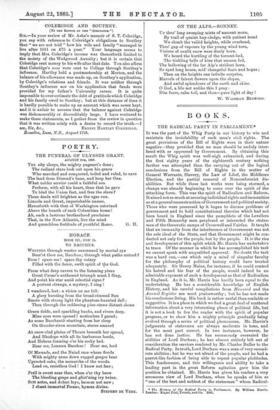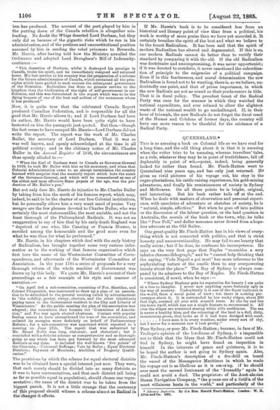BOOKS.
THE RADICAL PARTY IN PARLIAMENT.* IT was the part of the Whig Party in our history to win and maintain the inviolability of each man's civil rights. The great provisions of the Bill of Rights were in their nature negative--they provided that no man should be unduly inter- fered with or oppressed by Government. By obtaining this result the Whig spirit was well-nigh exhausted, and during the first eighty years of the eighteenth century nothing further was attempted than the carrying out of the logical conclusions from the Bill of Rights in the matter of General Warrants, Slavery, the Law of Libel, the Middlesex Election, and the partial removal of Nonconformist dis- abilities. But while these last works were being stormed, a change was already beginning to come over the spirit of the attacking force. This was the spirit of Radicalism and Reform. It aimed not so much at securing individual rights and immunities as at a general reconstruction of Government and political society. Those who were possessed by it began to discuss problems of government and to hold constitutional theories which had not been heard in England since the pamphlets of the Levellers and Fifth Monarchy men perplexed or interested the states- men of the theocratic camps of Cromwell and Fairfax. It taught that an immunity from the interference of Government was not the sole ideal of the State, and that Government might be con- ducted not only for the people, but by the people. It is the rise and development of this spirit which Mr. Harris has undertaken
to trace. Of manner in which he has accomplished his task we cannot speak with unqualified approval. No doubt the task was a hard one,—one which only a mind of singular faculty for the philosophy of political history could have treated adequately. Sir Henry Maine, for instance, if he could control his hatred and his fear of the people, would indeed be an admirable exponent of such a development as that of Radicalism in England. As it is, Mr. Harris has hardly been equal to the undertaking. He has a considerable knowledge of English History, and his careful compilations from Hansard and the Annual Register are most praiseworthy ; but he has not made his conclusions living. His book is rather useful than readable or suggestive. It is a place in which we find a great deal of scattered information about a very interesting phase of political life, but it is not a book to fire the reader with the spirit of popular progress, or to show him a mighty principle gradually being evolved through a series of political phenomena. Mr. Harris's judgments of statesmen are always moderate in tone, and for the most part correct. In two instances, however, he has not done justice. He has enormously overrated the • abilities of Lord Durham ; he has almost entirely left out of consideration the services rendered by Mr. Charles Buller to the Radical Party. In truth, Lord Durham was a man of very second- rate abilities ; but he was not afraid of the people, and he had a parrot-like fashion of being able to repeat popular platitudes. This fearlessness, and this willingness and ability to take a leading part in the great Reform agitation gave him the position he obtained. Mr. Harris has given his readers a very erroneous view of Lord Durham, when he speaks of him as " one of the best and noblest of the statesmen " whom Radical- • The .71;story of the Radical Party in Parliament. By William Harris. London : Kegan Paul, Trench, and Co. 1885.
ism has produced. The account of the part played by him in the putting down of the Canada rebellion .is altogether mis- leading. No doubt the Whigs deserted Lord Durham, but they only did so because of the gigantic risks which he ran in his administration, and of the perilous and unconstitutional position assumed by him in sending the rebel prisoners to Bermuda. Mr. Harris, after having told how the Ministry annulled the Ordinance and adopted Lord Brougham's Bill of Indemnity, continues :—
" This desertion of Durham, whilst it destroyed his prestige in Canada, broke his spirit, and he immediately resigned and returned home. His last service to his country was the preparation of a scheme for the future administration of Canada, which contained all the prin- ciples which have guided to such success the subsequent government of the Dominion. Radicalism has done no greater service to the kingdom than the vindication of the right of self-government in our Colonies, and this was formulated in the report which was to be the dying bequest of one of the best and noblest of the statesmen whom it has produced?'
Now, it is quite true that the celebrated Canada Report produced Canadian Federation, and is responsible for all the good that Mr. Harris allows it; and if Lord Durham had been its author, Mr. Harris would have been quite right to have bestowed on him the panegyric just quoted. But then—though the fact seems to have escaped Mr. Harris—Lord Durham did not write the report. The report was the work of Mr. Charles Buller, the secretary of Lord Durham. That it was so was well known, and openly acknowledged at the time in all political society; and in the obituary notice of Mr. Charles Bailer in the Annual Register of 1848, the circumstances are thus openly alluded to :—
" When the Earl of Durham went to Canada as Governor-General in 1838, he took Mr. Buller with him as his secretary, and when that Colonial Administration came to an abrupt termination the country learned with surprise that the masterly report which bore the name of the Governor-General, and which will be remembered as one of the ablest and moat effective State papers of the age, was the pro- duction of Mr. Bailer's pen."
But not only does Mr. Harris do injustice to Mr. Charles Buller by taking from him the merit of his famous report, which may, indeed, be said to be the charter of our free Colonial institutions, but he personally allows him a very scant meed of praise. Very meagre are the few phrases devoted to Charles Buller, who was certainly the most statesmanlike, the most amiable, and not the least thorough of the Philosophical Radicals. It was not an exaggeration to say of him that by his early death England was " deprived of one who, like Canning or Francis Horner, is enrolled among the honourable and the good more even for what he was than for what he performed."
Mr. Harris, in his chapters which deal with the early history of Radicalism, has brought together some very curious infor- mation as to the working of that famous organisation which first bore the name of the Westminster Committee of Corre- spondence, and afterwards of the Westminster Committee of Association. In the year 1784 a series of proposals for a very thorough reform of the whole machine of Government was drawn up by this body. We quote Mr. Harris's account of their proceedings as a fair example of his style and manner of narration :—
"On April 3rd a sub-committee, consisting of Fox, Sheridan, and Colonel Fitzpatrick, was instructed to draw np a plan of an associa- tion to be submitted to the general meeting called by advertisement to 'the nobility, gentry, clergy, electors, and the other inhabitants paying taxes to the Government resident in the City and Liberty of Westminster.' At the public meeting the plan of the association was adopted ; the committee then became the ' Committee of Associa- tion," and Fox was again elected chairman. Contact with popular feeling seems to have strengthened the tone of the committee, and enlisted its energies more definitely on behalf of Parliamentary Reform ; for a sub-committee was appointed which reported to a meeting on June 27th. The report that was submitted by Mr. Brand Hollis was long, elaborate, and rhetorical ; but it concluded with a definite scheme as comprehensive and as thorough- going as any which has been put forward by the most advanced Radicals at any time. It included the well-known five points' of the Chartists,—Universal Suffrage; Vote by Ballot ; Equal Electoral Districts; Payment of Members ; Abolition of Property (1 he Lou 0- - rope- -y ylla----- cation."
The provisions by which the scheme for equal electoral districts was to be obtained have a special interest just now. They were, that each county should be divided into as many districts as it was to have representatives, and that each district (all being as far as possible equal in population), should choose one repre- sentative ; the name of the district was to be taken from the biggest parish. It is not a little strange that the centenary of this proposal should witness a scheme almost as Radical in the changes it effects. If Mr. Harris's book is to be considered less from an historical and literary point of view than from a political, his work is worthy of more praise than we have yet accorded it. It certainly breathes the spirit of the best and what we believe to be the truest Radicalism. It has been said that the spirit of modern Radicalism has altered and degenerated. If this is so, our modern Radicals cannot do better than to rectify their standard by comparing it with the old. If the old Radicalism was doctrinaire and uncompromising, it was never opportunist; if it was devoted to crotchets, it never sanctioned the subordinsa tion of principle to the exigencies of a political campaign. Even if in this fearlessness, and moral determination the new Radicalism is found not to be wanting, there is, as we believe, unr doubtedly one point, and that of prime importance, in which the new Radicals are not as sound as their predecessors in title. That is in fiscal policy. The proudest boast of the Radical Party was once for the manner in which they watched the national expenditure, and ever refused to allow the slightest waste of the national wealth to go unchallenged. If, in their hour of triumph, the new Radicals do not forget the fiscal creed of the Humes and Cobdens of former days, the country will have one more reason to be thankful for the existence of a Radical Party.



































 Previous page
Previous page